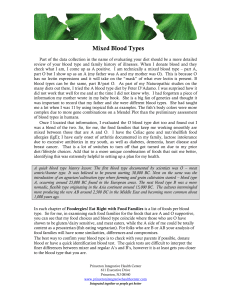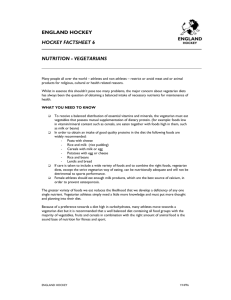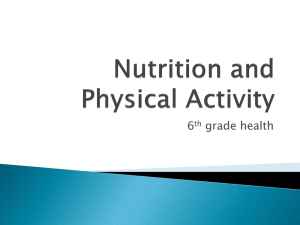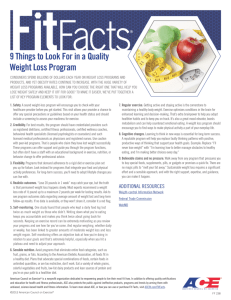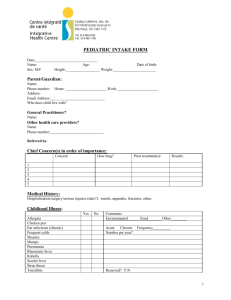What is the appropriate diet for a human being?
advertisement
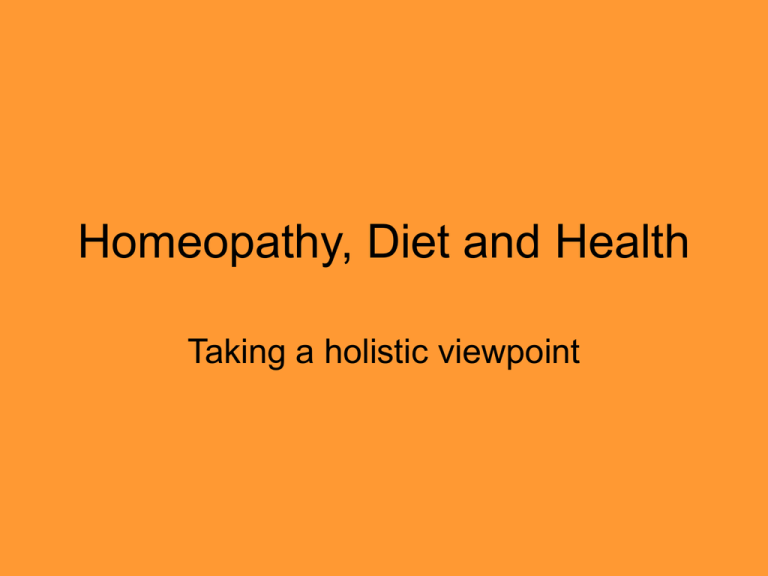
Homeopathy, Diet and Health Taking a holistic viewpoint Hahnemann, Organon Aphorism 36 - 38 • Only one disease can exist in the body at a time. Hering’s Law of Cures • Symptoms should disappear in the following order - from within outwards, from above downwards, from more important organs to less important organs, and in the reverse order in which they appeared. The epidemics today • • • • • • Heart disease Hypertension Diabetes Cancer Obesity Constipation 72 year old man with • Diabetes - 25 years (allopathy) • Heart disease and hypertension - 7 years (allopathy) • Cancer of the bladder - few months (no treatment) • What should go first? Multiple diseases • This will not work according to Hering’s law which is for symptoms of a natural disease. • The artificial suppressions have to be removed first. • In order to stop the medications for diabetes and blood pressure we need to first remove the cause for these two. Awareness • Homeopathy can treat through awareness but its not so helpful in situations where we lack collective awareness as a species. Lifestyle changes - rapid, gentle, permanent recovery. • 74 year old patient of diabetes since 30 years - blood sugar 222. Within 2 weeks 88. • 22 year old patient with insulin dependant diabetes - insulin injections 3 times a day stopped insulin in 3 days. • 56 year old diabetic - diabetes controlled in 1 month. • 76 year old patient, 3 years heart disease, 3 weeks in hospital - off medication in 2 months. • 3 year old with chronic constipation stool needing mechanical removal - normal stools within days. • Obesity - weight loss which does not revert after sometime. • 11 year old with high blood pressure reversed in 1month. • 25 year old with asthma - no more attacks. Unnatural diet as a maintaining cause What would be the natural food for the human being? Humans are predominantly Herbivorous Reasons • • • • • • • • Primate ancestry Teeth Movement of jaws Saliva Long intestines Absence of claws Method of drinking Night vision absent Carnivore’s digestive system Recent research: humans are herbivores and not omnivores • http://www.earthsave.bc.ca/material s/articles/health/comparative.html Our Herbivorous Habits • • • • Living in groups Desire for sweets Natural instincts Frequency of eating Hart & Robert W. Sussman, Ph.D., professor anthropology Milk and Milk Products Milk: a health food - but only for the calf. Foods natural to our anatomy No meat - where will I get my protein? Ever heard of someone with protein deficiency? (Where do cows get their protein?) Protein deficiency linked to severe malnutrition. • Primary disease linked to inadequate protein consumption - Kwashiorkor • Primary diseases linked to excess protein consumption - osteoporosis and kidney disease. Percentage of protein in different animal’s milks • • • • • • • • Man Monkey Guinea Pig Rat Dog Cat Cow Goats 1.25 - 2.7 2.3 8.55 8.7 10.11 11.1 3.3 - 4 4.1 If I don’t drink milk where do I get my calcium? Calcium content of foods (per 100-gram portion) • • • • • • • • • • • • • • 1. Human Breast Milk 33 mg 2. Almonds 234 mg 3. Amaranth 267 mg 4. Apricots (dried) 67 mg 5. Beans (pinto, black) 135 mg 6. Beet greens (cooked) 99 mg 7. Bran 70 mg 8. Swiss Chard (raw) 88 mg 9. Chickpeas (garbanzos) 150 mg 11. Collards (raw leaves) 250 mg 12. Cress (raw) 81 mg 13. Figs (dried) 126 mg 14. Hazelnuts 209 mg 15. Kale (raw leaves) 249mg • • • • • • • • • • • • • • • 16. Kale (cooked leaves) 187 mg 17. Lettuce (dark green) 68 mg 18. Molasses (dark) 684 mg 19. Mustard Green (raw) 183 mg 20. Mustard Green (cooked) 138 mg 21. Parsley 203 mg 22. Pistachio nuts 131 mg 23. Potato Chips 40 mg 24. Raisins 62 mg 25. Sesame Seeds 1160 mg 26. Sugar (Brown) 85 mg 27. Tofu 128 mg 28. Spinach (raw) 93 mg 29. Sunflower seeds 120 mg 30. Water Cress 151 mg The Relation of Protein to Calcium • The Nurse's Health Study recently found women who consumed 95 grams of protein a day compared with those who consumed less than 68 grams a day had a 22% greater risk of forearm fractures. Calcium imbalances in the zone diet Principal Investigator Calcium intake (mg) Protein Intake (g) Calcium Balance (mg) C.A. 500 95 - 58 R.W. 800 95 +1 H.L. 500 95 - 60 H.L. 800 95 0 C.A. 500 142 -120 M.H. 500 150 -116 R.W. 800 142 - 85 Dr Benjamin Spock warned against milk "Cow's milk in the past has always been oversold as the perfect food, but we are now seeing that it isn't the perfect food at all and the government really shouldn't be behind any efforts to promote it as such." "Cow's milk has become a point of controversy among doctors and nutritionists. There was a time when it was considered very desirable, but research has forced us to rethink this recommendation...dairy products contribute to a surprising number of health problems..." Benjamin Spock, M.D., "Child Care," 7th Edition What else is bad about Milk? Milk is a cocktail of the following ingredients • • • • • Hormones Pus - average 7 drops / glass Concentration of pesticides Antibiotics Bacteria We consume more milk than we think. Milk and its products are in many readymade foods • 1 oz of cheese is made from 16 oz of milk! Vegan diet and Stamina • Dr. Per-Olaf Astrand conducted an informal study of diet and endurance using nine highly trained athletes, changing their diet every three days. At the end of every diet change, each athlete would pedal a bicycle until exhaustion. Those with • a high protein and high fat meat (carnivore) diet averaged 57 minutes. • a mixed (omnivore) diet, lower in meat, fat and protein averaged 1 hour and 54 minutes: twice the endurance of the meat and fat eaters. • A high carbohydrate diet lasted 2 hours and 47 minutes, triple the endurance of the high-protein group. (Source: Astrand, Per-Olaf, Nutrition Today 3:no2, 9-11,1968) (http://www.filipinovegetarianrecipe.com/why_vegetarian_foods_are_best_for_you/vegetarian_ foods_are_energizing.htm) More Strong and powerful vegans. Our needs • pH alkaline • Fibre • Nutrients • Health = Health = Nutrition Calories (Eat to Live, Joel Fuhrman, MD) What about nutritional supplements? Unnatural Plant based foods Refined foods • Oil • Other fats like butter, lard, margarine, butter substitutes • Sugar • White flour (our ‘brown breads’) • White rice • Processed foods, soft drinks All of these give us calories without nutritional value. Because of the lack of fibre, more is eaten leading to obesity. Effects of refined foods • Diabetes, heart disease, elevated triglycerides, elevated cholesterol, constipation and obesity... • Whole foods contain complex carbohydrates. • Refined foods contain simpler carbohydrates. Percentage of nutrients lost when whole wheat flour is refined into white flour Food Revolution - John Robbins • • • • • • • • • Protein 25% Fibre 95% Calcium 56% Iron 84% Phosphorus 69% Potassium 74% Zinc 76% Copper 62% Manganese 82% • • • • • Selenium 52% Thiamin (vit B1) 73% Riboflavin (vit B2) 81% Niacin (Vit B3) 80% Pantothenic Acid (vit B5) 56% • Vitamin B6 87% • Folate 59% • Vitamin E 95% Effects of sugars • No longer resembles a food, is an artificial substance and a drug. • The chemicals used in processing (phosphoric acid, calcium phosphate and others) are potent and health-debilitating. • Has a tremendous amount of carbonic acid which disturbs the nutritional balance. • Robs the body nutrients, especially the minerals chromium, zinc and calcium, and vitamins C and B-complex. Sugar • Destroys digestion enzymes in the mouth, stomach, the small intestines and the pancreas. • Is released into the blood too quickly which is toxifying and damages the body cells. Sugar in fast foods and ready made foods • 70 percent of the sugar we consume is hidden in foods. • 12-ounce soda contains 10 teaspoons of sugar. • Even pizza has a considerable amount of sugar in it, and so does commercial tomato ketchup. Effects of caffeine (found in coffee, tea, colas) • Increases stomach acid secretion and promotes ulcers. • Produces anxiety, irritability, depression mood changes. • Stimulant action - Raising the blood pressure, damaging blood vessels and causing heart attacks. • Birth defects. Infant deaths. Effects of colas Fried Foods • Carbohydrates subjected to high temperatures become carcinogenic. • Oil heated over or for a long period of time is carcinogenic. • What oils should we use? • Oil Alternatives • Alternative to frying Essential Fatty Acids • Only plants can create two types of polyunsaturated fats called essential fatty acids (EFA) known as omega-3 and omega-6 fats (w-3 and w-6 fats). Plants rich in EFA • Linoliec acids - safflower, sunflower, hemp seed, soyabeans, walnut, pumpkin, sesame, flax • Alpha Linolenic - flax, hemp, canola (rapeseed), soybeans, walnut, green leafy vegetables, purslane, perilla • Gamma Linolenic - borage, black currant seed, primrose Too much of a good thing • These EFA’s protect against atherosclerosis and heart attacks, as well as relieve rheumatoid arthritis, diabetic neuropathy. • Larger intake of these also leads to heart attacks. Less refined foods are less harmful but not as good as whole foods • Examples : fruit juices, molasses, rice syrup etc. Raw foods are live foods Dead foods Rules to Follow in Diet • Eat foods that are anatomically suitable. • Eat whole rather than refined or processed in any way. • Eat fresh foods, unprocessed. • Eat foods grown in the vicinity and that are seasonal. • Choose organic over artificially grown ones. • Food combining is important. • Avoid junk food and artificial food. Health Considerations of Organic • Toxic effect of pesticides cause cancer, Parkinson’s, diabetes, hormonal disturbances including early puberty and various other diseases. • Diminished nutritive value of non organic produce. Organic Produce vs conventional produce Percentage of dry weight Millequivalents per 100 grams dry weight Trace amounts parts per million dry matter Total miner al ash Phos Calc Magn Potas Sod Bor Mang Iron Cop Cob P Ca Mg K Na B Mn Fe Cu Co Snap Beans Organic Commercial 10.45 4.04 0.36 0.22 40.5 15.5 60.0 14.8 99.7 29.1 20.4 0.8 73.0 10.0 60.0 2.0 227.0 10.0 69.0 3.0 0.26 0.00 Cabbage Organic Commercial 10.38 6.12 0.38 0.18 60.0 17.5 43.6 13.6 148.3 33.7 20.4 0.8 42.0 7.0 13.0 2.0 94.0 20.0 48.0 0.4 0.15 0.00 Lettuce Organic Commercial 24.48 7.01 0.43 0.22 71.0 16.0 49.3 13.1 176.5 53.7 12.2 0.00 37.0 6.0 169.0 1.0 516.0 9.0 60.0 3.0 0.19 0.00 Tomatoes Organic Commercial 14.20 6.07 0.35 0.16 23.0 4.5 59.2 4.5 148.3 58.8 6.5 0.0 36.0 3.0 68.0 1.0 1938. 1.0 53.0 0.0 0.63 0.00 Spinach Organic Commercial 28.56 12.38 0.52 0.27 96.0 47.5 203.9 46.9 237.0 84.6 69.5 0.0 88.0 12.0 117.0 1.0 1584. 49.0 32.0 0.3 0.25 0.20 Vegetable Decline of mineral content in some vegetables, 1914 - 1992 (average per 100gms) 1914 1948 1992 Calcium 248.00 mg 38.75 mg 47.00 mg Magnesium 66.00 mg 29.60 mg 15.00 mg Iron 1.50 mg 5.70 mg 0.59 mg Calcium 265.50 mg 38.50 mg 19.00 mg Magnesium 112.00 mg 31.20 mg 9.00 mg Iron 94.oo mg 26.25 mg 10.50 mg Calcium 227.30 mg 71.75 mg 99.00 mg Magnesium 122.00 mg 125.40 mg 79.00 mg Iron 64.00 mg 80.15 mg 2.70 mg Cabbage Lettuce Spinach •Source: The Healing Power of Minerals by Paul Bergner, Prima Publishing 1997 What are the results of eating foods with high nutritive value • Quantity required decreases. • No nutritional supplements are required. • Tasty. Spices and food additives are not needed. Results of eating foods with low nutritive value • Obesity with poor health. B12 in Vegans • This is the only nutrient that anyone on a whole food plant based diet is likely to lack. • B12 is only made by bacteria, yeast and tiny life forms. • Meat and milk have plenty of B12 due to the huge bacterial flora. Natural Vegan B12 sources • Intestinal flora • Fermented foods such as miso, tempeh, sauerkraut, plant milk yogurts, rejeuvelac. • Nutritional yeast, spirulina Reasons for B12 deficiency in vegans • Sterility of foods (pesticides, fertilisers irradiation) You can avoid this by eating organic produce from farmers markets or growing your own. • Antibiotics taken Disease as a path to personal growth • The significant problems we face cannot be solved at the same level of thinking we were at when we created them. Albert Einstein Chronic Diseases Start at a very young age but we do not notice them because of our natural body reserves Obesity • Hunger will be felt until the nutrient need is met or until the stomach capacity is filled. • Fibre is volume without calories. • Fibre contains nutrients and enzymes. Constipation • Fibre holds water and keeps stools soft. • Straining for stools can cause hemorrhoids, diverticulitis, appendicitis, hiatus hernia. Remnants cause irritable bowel syndrome Heart Disease and Hypertension • Only animals produce cholesterol. Plants never do. We being animals produce and need cholesterol. Excess comes from animals and fried foods • High caffeine and sodium intake, smoking also affect. Diabetes • The result of diabetes is high blood sugar. • The causes - simple carbohydrates and sugar in large quantities • IGF from milk Cancers and tumours • Proteins are growth producing foods. • Hormones in milk predispose to breast, ovarian and prostate cancers. • Lack of fibre in meat and milk cause intestinal cancer and lend to absorption of toxins. Problems of the Teeth and skeletal system, osteoporosis • Starts from childhood - the condition of the teeth are an indicator. • Causes - anything having an acid reaction in the body - proteins, sugar, colas, coffee, tea, wine.. Other diseases that are caused by meat and milk • Indigestion and Gas formation, acidity • Arthritis and joint complaints • Kidney stones • Urinary tract infections • Acne • Allergies • Asthma and sinus infections (milk) • Depressions, mood swings, stress • Iron Deficiency (milk) • Tuberculosis • Mad cow disease (CJS) References • Reversing Heart Disease - Dean Ornish • Eat to Live - Joel Fuhrman (www.drfuhrman.com) • The McDougall Plan - Dr McDougall (www.drmcdougall.com) • The China Study - T Colin Campbell • Food Revolution & A Diet for a New America John Robbins Food, like homeopathy affects the mind and body • Emotions caused by adrenaline in flesh foods - fear, anxiety, depression, lack of self confidence, violence, suffering desperation, isolation, stress. Veal Chicken Transport Pigs Sows Organic Dairy "Nothing will benefit human health and increase the chances for survival of life on Earth as much as the evolution to a vegetarian diet" Vegetarian food leaves a deep impression on our nature. If the whole world adopts vegetarianism, it can change the destiny of humankind.” Albert Einstein “ ECOLOGICAL IMPACT Food for thought Water • • • • 500 litres 600 litres 2000 litres 1,00,000 litre 1 kg of potatoes, 1 kg of wheat, 1 kg of rice, 1 kg of beef Livestock consume 80% of the world’s water supply. Land Usage • 12 - 16 kilos of grain - 1 kilo of meat or milk. • Non vegetarian - 16 acres of land • Vegetarian - 0.5 acres Grazing destroys the forests. 260 million acres of virgin forest are cleared for cropland to support a meat centered diet. Energy The world’s petroleum reserves would last for 13 years if all humans were meat eaters 260 years if all humans were vegetarian 60 million people die of starvation each year. Is it because of the meat we eat? • 80% of the corn grown and 40 % of the total grains are consumed by livestock. • 12 Lbs of wheat produce 12 loaves of bread or 1 hamburger. • One billion humans could be saved from starvation if Americans ate just 10% less meat. The figures • There are now 20 billion livestock on earth - more than triple the number of human beings! • Livestock contribute to more greenhouse gases than all the cars combined. • Isn't man an amazing animal? He kills wildlife by the million in order to protect his domestic animals and their feed. Then he kills domestic animals by the billion and eats them. This in turn kills man by the million, because eating all those animals leads to degenerative - and fatalhealth conditions like heart disease, kidney disease, and cancer. So then man tortures and kills millions more animals to look for cures for these diseases. Elsewhere, millions of other human beings are being killed by hunger and malnutrition because food they could eat is being used to fatten domestic animals. Meanwhile, some people are dying of sad laughter at the absurdity of man, who kills so easily and so violently and, once a year, sends out cards praying for "Peace on Earth." Coats, C. David from Old MacDonald's Factory Farm • Until he extends the circle of his compassion to all living beings, man will not himself be free. Dr Albert Schweitzer 1875 - 1965 Many good reasons to go vegan besides health • • • • • Starvation and poverty Ecology and environment Wildlife Human rights Animal rights There are lots of different theories about what to eat. How do we know what to believe? • Understand what nature intended for us. • Think whole - In nature there is always a balance. If it is right for you it will also be right for the environment and right for other species. How to help your patients using this method • Change your own diet first guide. • Do lab tests before and after. • Make sure they do it 80 % at least. If they are very sick insist on 100% compliance. • Be sure to help the get off the medications • Once you have gotten into it, its simpler that homeopathy, the results are faster and as high as 90%. After the patient is rid of most of his physical problems the homeopathic picture becomes very clear if at all a remedy is still needed. How to cook? • Compassionate Cooks www.compassionatecooks.com • Dr McDougall’s DVD www.drmcdougall.com Would you sacrifice your tastes for my life? Harold
